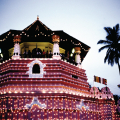It is on the banks of the lake of Kandy, last capital of the Sinhalese kingdom, that was built at the beginning of the XVIIIth century, the Sri Dalada Maligawa, the Temple of the Sacred Tooth. Its construction was completely finished in 1782. The temple, which is part of the royal palace of Kandy, houses the relic of the "Sacred Tooth" of Buddha. The city, which dominates at an altitude of nearly 500 meters, is now a UNESCO World Heritage Site, partly because of this major site, a perfect example of religious fervor in the country.
The symbolism of the place
Behind this relic of the tooth, there is a whole symbolism. The story goes that it was saved from the flames of the funeral pyre in 543 BC. It would then have lived a long journey between Ceylon and India before ending its journey in the Kingdom of Kandy. This story is important for the Sri Lankan people, indeed, for years and still today, the possession of this tooth is synonymous with power. Legend has it that the holder of the tooth has the "divine right to rule the country". This is probably why it is so well guarded.
Over the years, the temple has undergone several reconstructions and renovations, notably following attacks in 1989 and 1998 (since then, security has been highly reinforced). Each time, the temple was rebuilt identically. Note that it took nearly four years to restore its luster to the site, heavily damaged by the attack of January 25, 1998. It is one of the most important Buddhist sites to visit in Sri Lanka.
Every day, the tooth is subjected to three ceremonies during which it is exposed by the monks. On Wednesday, the relic is carefully washed with sacred water, which is then used by the monks of the temple for its virtues.
The enclosure of the temple includes several buildings or places to visit
The Vahahitina Maligawa, the Alut Maligawa, the Sri Dalada Museum, the Mangul Maduwa and the Rahja Pavilion. The entrance fee gives you access to all of them, as well as the loan of an audioguide in French. You will walk around the site barefoot and must leave your shoes at the main entrance. Respectful dress is required.
The sanctuary (Vahahitina Maligawa). Composed of two levels, it is located in the center of a paved courtyard. It is in this sanctuary that the tooth of the Awakened One is located. The relic is kept on the upper level in seven golden boxes placed one inside the other. If you cannot approach the tooth, the room in which it is kept is worth a visit: the elephant tusks at the entrance are sublime. The passage in front of the tooth is possible every day, at a precise hour. The crowd present only allows a passage in line but the permanent spectacle of the devotees on the spot and the atmosphere which reigns around the reliquary are impressive.
Alut Maligawa and Sri Dalada Museum. Open every day from 6:30 am to 7:30 pm. On the other side of the shrine, by the opposite exit from your arrival, a three-story building. On the first floor, the Alut Maligawa contains about thirty Buddhas donated by Thai devotees. On the upper two floors, the Sri Dalada Museum is devoted to the display of objects related to the temple and the region as well as correspondence. You can also see a series of photos testifying to the attack perpetrated against the temple by the LTTE in 1998.
Rajha Tusker Museum (Rajha pavilion). Open daily from 6:30 am to 7:30 pm. Following the Mangul Maduwa. This pavilion is dedicated to the patriarch of the Kandy elephants, who died in 1988 at the age of 84. You will find his remains preserved here, behind a large glass case. Rajha, as he was called, traditionally carried the relic of the Tooth in the Esala Perahera procession and was given a state funeral.
Mangul Maduwa (Audience Hall). Exiting from the left side of the shrine, you come to the Audience Hall. It is an open hall with a roof supported by 65 carved wooden pillars. It was begun in 1783 but not finished until much later. It was here that the Kandyan chiefs ratified the cession of the kingdom to the British crown in 1815.
The Perahera festival (festival of the tooth), a colorful parade.
If the visit of this temple can be done all year long, it is during the festival of Perahera, that it is all the more interesting. This festival exists since the 18th century, when the relic of the tooth was still in the possession of the King of Kandy. The people, then, never had the opportunity to see it and thus to venerate it. It is for this reason that King Rajasingh, decided to organize an event during which, the people could also come to honor this tooth.
Since then, every year at the same time of the year (end of July - beginning of August), and this for 10 days, at nightfall, the holy city of Kandy reveals another facet. On the program: first big stage of the festival, during which the jackfruit is cut into 4 pieces before being planted (each part represents a deity). Then, it is from the 6th night that the festival begins to beat its fullness: dancers, musicians, elephants dressed and made up parade for the greatest happiness of the crowd. People come to see the many elephants parade, the oldest of them, carrying a replica of the relic, security forces. The ceremony ends during the day.
Did you know? This review was written by our professional authors.
Book the Best Activities with Get Your Guide
Members' reviews on SRI DALADA MALIGAWA
The ratings and reviews below reflect the subjective opinions of members and not the opinion of The Little Witty.

